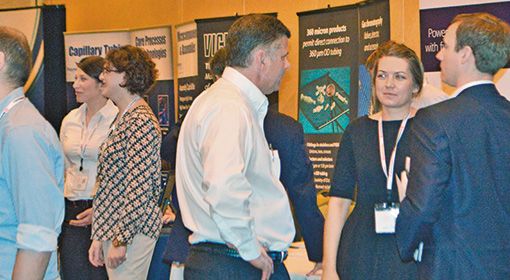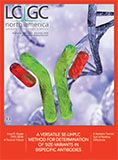Deep in the Heart of Texas, Chromatography Advances
LCGC North America
The 2019 ISCC and GCxGC Symposia, May 12–17, 2019, in Fort Worth, Texas, promise to provide an exciting and relevant venue for discussions of the latest developments in chromatography.
At the 2019 ISCC and GC×GC Symposia, May 12–17, 2019, in Fort Worth, Texas, chromatographers from around the world will convene to discuss the latest developments.
Comprehensive chromatography, microscale separations, sample preparation, and the latest supporting technologies, oh my! When we say that the 43rd International Symposium on Capillary Chromatography (ISCC) and the 16th GC×GC Symposium (www.isccgcxgc.com) will bring people together to share the latest developments, we mean it. Starting Sunday, May 12, 2019, we'll show you how it's done. The ISCC & GC×GC event truly has it all, and whether it's the latest developments by industry, professional development and education, interaction with key opinion leaders, or the latest cutting edge research you seek, you will find it in Fort Worth, Texas, at the historical Hilton Ft. Worth in the heart of downtown from May 12 to 17, 2019.

(PHOTO CREDIT TO DANIELLE SCHUG)
Five days of state-of-the-art science, practical education, social events, and unparalleled cultural experiences make for a great way to spend a week in May in the heart of the Dallas–Fort Worth metroplex. This event is the U.S. version of the highly successful ISCC & GC×GC conferences that are held in even years in Riva del Garda, Italy. By popular demand, 2019 will mark the third successive time the conference will be held in the "Gateway to the West"- Ft. Worth, Texas. Whether it is your first time or your third time attending, you will find that our conference organizers have really stepped up their game this time around. For sure, time spent by industry, academic, and government scientists alike, from near and abroad, will be productive, enjoyable, and informative.
The Latest Developments
Want to know the most recent developments in gas and liquid chromatography columns and detection systems? We have that. Want to know the state of the art in microscale liquid chromatography? We'll have experts on hand to discuss it. Want to see the latest in pumped and electrically-driven separations, including microfluidics? We have it covered. Are you interested in comprehensive chromatography techniques, and how they can be used to improve resolution and determinations from complex mixtures? Look no further! ISCC and GC×GC is the premier venue for the latest development in comprehensive chromatography, especially two-dimensional gas chromatography (GC×GC), but also in two-dimensional liquid chromatography (LC×LC). Want to see what industry has on hand to support your research efforts? We will have the leading manufacturers and solution providers in the business ready to tell you what's new and to answer your questions.
A Wide Range of Applications
Are you interested in a particular application space? ISCC & GC×GC puts the most recent and relevant analytical technology in the context of so many areas of interest that there is hardly enough space to convey it here: pharmaceutical, forensic, and process analysis; contaminants in food and the environment; biomarker discovery, and protein analysis; petroleum, energy, and resource development; ionic liquids in chemical analysis; novel stationary-phase chemistry; software and data analysis; atmospheric, air, and breath analysis; lab-on-a-chip and microfluidics; novel detection techniques; multidimensional separations; new materials for sample preparation; and miniaturized and portable systems. The world's top researchers and thought leaders will be there, and so should you.
Top Plenary Speakers, Award Winners, and Panel Discussions
The plenary speakers will knock your socks off. Fred Regnier from Purdue University is an unparalleled innovator. He will describe analyte-sequestering transport phases, an exciting new sample preparation technology that he and his team have developed to isolate small molecules from complex matrices. Imagine what you can do with a third phase in chromatography-based separations. Jonathan Sweedler from the University of Illinois–Urbana Champaign uses a variety of separation and detection techniques to characterize the role of D-amino acids in a wide array of disease processes. It does not get more cutting edge than that. Chris Reddy from the Woods Hole Oceanographic Institute is the primary researcher studying the impact of the Deepwater Horizon oil spill in the Gulf of Mexico. GC×GC technology features heavily in his work, but he will talk about where there are still gaps and needs in the handling and mining of the massive data sets generated using comprehensive chromatography.
The fireworks don't stop there. Winners of the prestigious Golay Award, Ettre Award, Jon Phillips Award, Lifetime Achievement in GC×GC Award, and other esteemed leaders will share their work. Learn from the best educators in the country through a series of top-notch short courses on fundamental GC×GC, basic HPLC, capillary LC, and sample preparation for capillary chromatography. As a completely new offering, daily panel discussions will put leading experts from the commercial sector in front of you to discuss practical and emerging topics in analytical chemistry.
Present Your Work
Join us! ISCC & GC×GC offers a perfect setting for you to present your own breakthrough science, orally or in one of our engaging poster sessions. Posters will be judged by experts in the field to award a plethora of cash prizes to the best of the best. Registration and abstract submission open December 7, 2018. Need help getting there? Students and post-docs can apply for a large number of travel awards. Check our website for details.
Social and Networking Events
What more could you ask for? We'll supplement the presentation of leading science and fundamental education with a series of social events designed for inclusiveness. No nickel-and-diming here. Rub elbows with old and new friends alike at an authentic Tex-Mex conference banquet with open bar, or during happy hour at the local pub. Fort Worth and the Dallas–Fort Worth metroplex have plenty to offer the art enthusiast, foodie, socialite, or sports fan alike, so you might as well bring your family along. Getting there from virtually anywhere in the world could not be easier. We stand ready to field your inquiries at info@isccgcxgc.com. Don't miss out on an experience like no other!

New TRC Facility Accelerates Innovation and Delivery
April 25th 2025We’ve expanded our capabilities with a state-of-the-art, 200,000 sq ft TRC facility in Toronto, completed in 2024 and staffed by over 100 PhD- and MSc-level scientists. This investment enables the development of more innovative compounds, a broader catalogue and custom offering, and streamlined operations for faster delivery. • Our extensive range of over 100,000 high-quality research chemicals—including APIs, metabolites, and impurities in both native and stable isotope-labelled forms—provides essential tools for uncovering molecular disease mechanisms and exploring new opportunities for therapeutic intervention.
New Guide: Characterising Impurity Standards – What Defines “Good Enough?”
April 25th 2025Impurity reference standards (IRSs) are essential for accurately identifying and quantifying impurities in pharmaceutical development and manufacturing. Yet, with limited regulatory guidance on how much characterisation is truly required for different applications, selecting the right standard can be challenging. To help, LGC has developed a new interactive multimedia guide, packed with expert insights to support your decision-making and give you greater confidence when choosing the right IRS for your specific needs.

.png&w=3840&q=75)

.png&w=3840&q=75)



.png&w=3840&q=75)



.png&w=3840&q=75)











